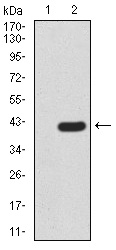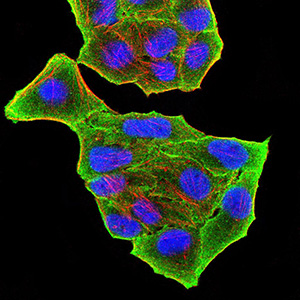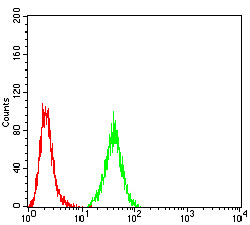Product Detail
Product NamePRDM5 Antibody
Clone No.12C-D4
Host SpeciesMouse
ClonalityMonoclonal
PurificationProA affinity purified
ApplicationsWB, ICC, FC
Species ReactivityHu, Ms
Immunogen DescRecombinant protein
ConjugateUnconjugated
Other NamesBCS2 antibody
PFM 2 antibody
PFM2 antibody
PR domain containing 5 antibody
PR domain containing protein 5 antibody
PR domain zinc finger protein 5 antibody
PR domain-containing protein 5 antibody
PRDM 5 antibody
PRDM5 antibody
PRDM5 protein antibody
PRDM5_HUMAN antibody
Accession NoSwiss-Prot#:Q9NQX1
Uniprot
Q9NQX1
Gene ID
11107;
Calculated MW73 kDa
Formulation1*TBS (pH7.4), 1%BSA, 40%Glycerol. Preservative: 0.05% Sodium Azide.
StorageStore at -20˚C
Application Details
WB: 1:1,000-1:2,000
ICC: 1:50-1:200
FC: 1:50-1:100
Western blot analysis of PRDM5 on human PRDM5 recombinant protein using anti-PRDM5 antibody at 1/1,000 dilution.
Western blot analysis of PRDM5 on HEK293 (1) and PRDM5-hIgGFc transfected HEK293 (2) cell lysate using anti-PRDM5 antibody at 1/1,000 dilution.
ICC staining PRDM5 (green) and Actin filaments (red) in MCF-7 cells. The nuclear counter stain is DAPI (blue). Cells were fixed in paraformaldehyde, permeabilised with 0.25% Triton X100/PBS.
Flow cytometric analysis of Hela cells with PRDM5 antibody at 1/100 dilution (green) compared with an unlabelled control (cells without incubation with primary antibody; red).
A cDNA of PRDM5 was isolated based upon its homology to the PR domain of PRDM2. The gene encodes an open reading frame of 630 amino acids and contains a PR domain in the NH-terminal region followed by 16 zinc finger motifs. Through radiation hybrid analysis, PRDM5 was mapped to human chromosome 4q27, a region thought to contain tumor suppressor genes for ovarian, breast, lung, liver, colon, and other cancers. The gene has a CpG island promoter and is silenced in human breast, ovarian, and liver cancers. Upon infection of tumor cells, a recombinant adenovirus expressing PRDM5 causes G2/M arrest and apoptosis, suggesting that inhibition of PRDM5 may be involved in carcinogenesis.
If you have published an article using product 48384, please notify us so that we can cite your literature.






 Yes
Yes



